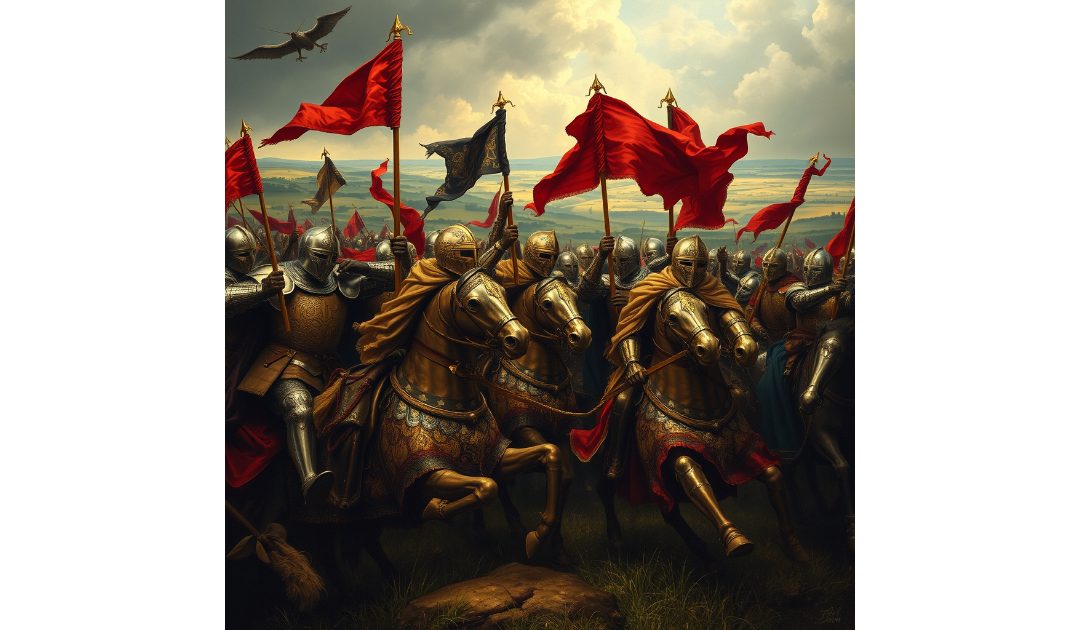The Battle of Tewksbury was fought on the 4th of May, 1471, during the War of the Roses. It was one of the most decisive battles in the Wars of the Roses, a series of civil wars fought over control of the English throne between the houses of Lancaster and York. This clash not only marked a significant victory for the Yorkists but also heralded the end of the Lancastrian resistance, leading to a period of relative stability under the reign of Edward IV.
In the years leading up to the battle, England was embroiled in a fierce power struggle. The conflict originated from competing claims to the throne after the deposition of Richard II and the ascent of the Lancastrian Henry IV. Over time, these tensions evolved into a wider struggle involving various factions and noble families, each vying for power and influence.
By the early 1470s, King Edward IV of the House of York had managed to secure the English throne after multiple conflicts with the Lancastrian supporters of Henry VI. However, the Lancastrian forces, backed by Margaret of Anjou, Henry VI’s formidable queen, and their son Edward, Prince of Wales, were far from defeated. They found refuge in France and began to plot their return to England to reclaim the crown.
In April 1471, Margaret and her forces attempted to land in England and muster support for their cause. They aimed to join forces with other Lancastrian loyalists, including those commanded by the powerful Earl of Warwick, who had recently betrayed Edward IV and allied with Margaret. However, Warwick’s defeat and death at the Battle of Barnet, a few weeks earlier, left the Lancastrian cause in a precarious position. Despite this setback, Margaret pressed on. She landed at Weymouth and began a perilous march north to join forces with other Lancastrians. Edward IV, having secured London and reinforced his army, moved swiftly to intercept Margaret’s forces before they could gather more strength. This urgency set the stage for the confrontation at Tewkesbury.
The battlefield at Tewkesbury was strategically chosen. Situated near the junction of the Severn and Avon rivers, it provided Edward with a strong defensive position. On the morning of the 4th of May, the two armies clashed on the fields south of Tewkesbury Abbey. The Lancastrians, numbering around 6,000 men, were led by Prince Edward himself, John Beaufort, Duke of Somerset, and other loyal supporters. Facing them was Edward IV’s army of about 5,000, commanded by himself and his brothers, including Richard, Duke of Gloucester, the future Richard III.
The battle commenced with a fierce exchange of artillery fire, followed by a direct assault by the Yorkists. Edward’s forces, well-disciplined and motivated, executed a flanking manoeuvre that disrupted the Lancastrian lines. The Lancastrians, unable to withstand the onslaught, started to falter under the pressure. A pivotal moment came when the Duke of Somerset, in a desperate attempt to turn the tide, launched a counterattack that ultimately failed. As the Lancastrians retreated in disarray, many sought refuge within the walls of Tewkesbury Abbey, but to no avail. Prince Edward was killed in the chaos, a devastating blow to the Lancastrian cause.
The aftermath of the battle was grim. Many leading Lancastrian nobles were captured and executed, including the Duke of Somerset. Margaret of Anjou was taken prisoner, and the mentally unstable Henry VI, who had been captured earlier, was executed shortly after, probably on Edward IV’s orders, to eliminate any further Lancastrian threat.
The Battle of Tewkesbury effectively marked the end of the Lancastrian hopes of reclaiming the throne. Edward IV’s victory solidified his reign and brought a temporary peace to a war-weary England. The brutal efficiency of the battle underscored the ruthless nature of the Wars of the Roses, where familial ties and allegiances were often severed by the sword. In the broader context of English history, the battle’s outcome had long-lasting implications. It paved the way for the eventual rise of the Tudor dynasty, as Henry Tudor, a distant Lancastrian claimant, would later defeat Richard III at Bosworth Field in 1485, ending the Wars of the Roses altogether.

